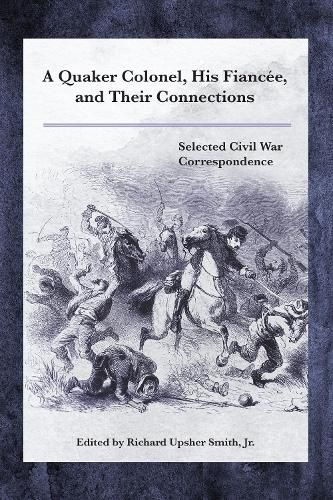Readings Newsletter
Become a Readings Member to make your shopping experience even easier.
Sign in or sign up for free!
You’re not far away from qualifying for FREE standard shipping within Australia
You’ve qualified for FREE standard shipping within Australia
The cart is loading…






A Quaker Colonel, His Fiancee, and Their Connections contains letters written during the American Civil War between a Union officer, his fiancee, and some of their connections. It opens a big window onto the lives of elite Northern women on the homefront during the Civil War. The pain of their separation from-and loss of-loved ones and friends at the front, their adaptation to unaccustomed work and acquisition of new skills, their labors for the soldiers at the front and in hospitals, their political involvement, not to mention elder- and childcare and illnesses, their almost morbid anxieties and indomitable wills, are revealed in these documents. Also, the experiences of their menfolk in the army are opened to view. The reader follows them into training camp and the Pennsylvania Reserves, into action for the salvation of Maryland for the Union, in the Army of the Potomac in its vicissitudes. Moreover, the principal male correspondent left the Army of the Potomac after the Battle of Fredericksburg, and became lieutenant colonel of a regiment of Pennsylvania Cavalry in Tennessee, seeing action in that state, Georgia, Alabama, and Mississippi. Evidence of the military-political-industrial complex that won the war is present throughout, as is evidence bearing on abolitionism and African-Americans.
$9.00 standard shipping within Australia
FREE standard shipping within Australia for orders over $100.00
Express & International shipping calculated at checkout
A Quaker Colonel, His Fiancee, and Their Connections contains letters written during the American Civil War between a Union officer, his fiancee, and some of their connections. It opens a big window onto the lives of elite Northern women on the homefront during the Civil War. The pain of their separation from-and loss of-loved ones and friends at the front, their adaptation to unaccustomed work and acquisition of new skills, their labors for the soldiers at the front and in hospitals, their political involvement, not to mention elder- and childcare and illnesses, their almost morbid anxieties and indomitable wills, are revealed in these documents. Also, the experiences of their menfolk in the army are opened to view. The reader follows them into training camp and the Pennsylvania Reserves, into action for the salvation of Maryland for the Union, in the Army of the Potomac in its vicissitudes. Moreover, the principal male correspondent left the Army of the Potomac after the Battle of Fredericksburg, and became lieutenant colonel of a regiment of Pennsylvania Cavalry in Tennessee, seeing action in that state, Georgia, Alabama, and Mississippi. Evidence of the military-political-industrial complex that won the war is present throughout, as is evidence bearing on abolitionism and African-Americans.